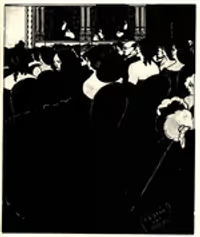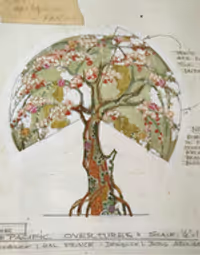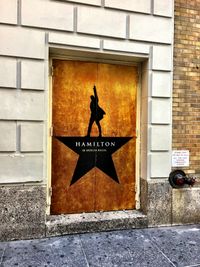LEOPOLDSTADT Reviews
gibsons2
Broadway Legend Joined: 8/26/19
#50LEOPOLDSTADT Reviews
Posted: 10/26/22 at 1:23pm
cotous6 said: "Does the show offer rush tickets?"
The rush tickets are $35. When I was was getting mine for one of the Wednesday matinees, I arrived to the box office around 9:20am, one person in front of me. By the time box office opened, there were about 10 people altogether. Our seats were in the orchestra, row N, far side. I didn't really miss anything, but would prefer to sit closer to the middle.
SisterGeorge
Broadway Star Joined: 5/8/19
#51LEOPOLDSTADT Reviews
Posted: 10/26/22 at 1:46pm
steven22 said: "I saw it yesterday and really wanted to love it. I liked it. The cast is uniformly excellent. I’m not sure how to pinpoint it but it just didn’t click for me."
Exquisitely staged and acted, but a bit of a disappointment as the themes and story felt quite familiar, and that's something I've never been able to say about any other Stoppard play. The final scene is unquestionably devastating, but bringing in a (SPOILER ALERT "woman in gold" plot device) seemed quite derivative at this point. (Frankly, I think the similar A Prayer for the French Republic is the fresher of the two.)
Is this a story that needs to be told over and over again? Absolutely, but for me, Stoppard's undisputed masterpiece remains the equally epic and heartbreaking "The Invention of Love," which is like no other play I've ever seen.
#52LEOPOLDSTADT Reviews
Posted: 10/31/22 at 8:24am
https://parterre.com/2022/10/11/street-scene/
"Stoppard never lingers on a character or storyline long enough to develop it into something worth caring about."
Found this somewhat ambivalent review/discussion of this play on Parterre Box this morning. I know the writers there can tend towards the negative. I haven't seen the play myself, & won't get to see it before it concludes its run. I was only browsing the site to read their take on Seattle Opera's just concluded run of Tristan & Islode. They reviewed the first performance, & I just saw the last performance Saturday. I disagreed with their take on the lead soprano Mary Elizabeth Williams; but as I saw her final performance, & perhaps she grew from when they saw her. I thought she was sensational.
Just mentioning all that because although I found this review interesting enough to share, if you had a better experience with Leopoldstat than these people did, I am not trying to diminish your delight.
The Other One
Broadway Legend Joined: 4/1/08
#53LEOPOLDSTADT Reviews
Posted: 10/31/22 at 9:37am
"Exquisitely staged and acted, but a bit of a disappointment as the themes and story felt quite familiar, and that's something I've never been able to say about any other Stoppard play. The final scene is unquestionably devastating, but bringing in a (SPOILER ALERT "woman in gold" plot device) seemed quite derivative at this point. (Frankly, I think the similar A Prayer for the French Republic is the fresher of the two.)"
I also saw similarities between Leopolstadt and Prayer for the French Republic but each stood strongly on its own, raising questions that the Jewish community can not afford not to ask.
Jarethan
Broadway Legend Joined: 2/10/11
#54LEOPOLDSTADT Reviews
Posted: 10/31/22 at 11:35am
I am surprised every time that someone says they are devastated by Leopoldstadt's last scene. It was the only scene I did not love. First, I felt that the 15 minutes where the young Stoppard discusses with the other two people his discovery and its implication was just too Cliff Notes. I felt that last scene could have been a full-length play. I felt the same was about A Doll's House Part 2; I felt it was a great outline for a play, but that it was just an outline, not a play. I was entertained but it just seemed so glib to me, I felt the same way here. IT could have been much more than it was. The very ending, where we learned what happened to all the people who were alive in 1938, was very food, but it didn't make up for the prior minutes. If the scene had to be so Cliff Notes, I would have staged it differently. I would have had the 'ghosts' on-stage for the entire scene...for me, the first part may have played better.
Still, I thought it was an excellent play, with a disappointing ending. But still an excellent play.
Now, I do have some thoughts that my party of three may have been the only people who felt that way. In this world of standing ovations for crap, this show did not get a standing ovation at the end and the applause were not noticably strong. I can't even remember the last time a show didn't, which is why they have lost their meaning.
There are two options only: either the audience was really disappointed with the play or, more likely, they were so hit by the end that they didn't think it was appropriate OR the idiots who start these standing ovations were simply not at the play. I have seen countless shows where the audience is sitting and then some idiots in front start standing, which creates a ripple effect so people can see. I suspect the middle option is the case, but really wish the people sitting up-front would stay in their seats.
VirginiaK
Chorus Member Joined: 4/15/12
#55LEOPOLDSTADT Reviews
Posted: 10/31/22 at 1:05pm
Another review, from a writer I like, George Blecher. I plan to see this anyhow but I found this review engaging. https://www.nycitywoman.com/tom-stoppards-leopoldstadt-on-broadway-a-review/
#56LEOPOLDSTADT Reviews
Posted: 10/31/22 at 3:44pm
Did Leopoldstadt ever officially announce an extension? Telecharge is selling tickets March 12.
Jarethan
Broadway Legend Joined: 2/10/11
#57LEOPOLDSTADT Reviews
Posted: 10/31/22 at 5:25pm
VirginiaK said: "Another review, from a writer I like, George Blecher. I plan to see this anyhow but I found this review engaging. https://www.nycitywoman.com/tom-stoppards-leopoldstadt-on-broadway-a-review/
I liked the play more than he did, but I also felt that (for me) the most interesting part of the play, which takes place in 1955 was a major let-down, because it could have accomplished so much more in considering the impact on the Stoppard character of learning his real family history, vs. what he thought it was. I can't remember if he didn't even know that he was Jewish or if he was raised as a non-practicing Jew (and never thought about being Jewish and what his family history might actually have been).
#58LEOPOLDSTADT Reviews
Posted: 10/31/22 at 5:49pm
My understanding is Stoppard didn't know he was half-Jewish till he was in his 50's.
Jarethan, your comments closely match mine regarding this play. It struggles to grab a hold of an immense idea and settles for a more comfortable family drama with laughter and tears and then a cataclysmic crisis in Act 4.
I was flummoxed by the play spending so much time on the cuckhold/duel story rather than the essential point of the Stoppard stand-in discovering his Jewish identity in Act 5.
Also, from 3rd row in the mezzanine it was a real challenge parsing which character was which from act to act. I could have used a more theatrical staging of the play where during the act changes, each child actor could touch hands with his adult counterpart, or each young parent could embrace his elderly counterpart, simply to lead the audience more clearly through the generations.
Jarethan
Broadway Legend Joined: 2/10/11
#59LEOPOLDSTADT Reviews
Posted: 10/31/22 at 8:01pm
I had read several rave reviews which said that they concluded that it was not necessary to remember each character. As a result, I didn’t go crazy trying to remember them all — which I normally would have done — and I think I was fine. I think part of the point was that these horrific things happened no matter who you were. I concluded after lunch the fact that I did remember the people I needed to. Certainly not typical.
i really did think it was a very well written and performed production, and I was thoroughly engaged, but — when the rubber hits the road — up to the last scene, we have seen many excellent productions that have covered that territory. To think of two, I would cite the TV series Holocaust and the vastly under-appreciated movie Sunshine, which starred Ralph Fiennes and Jennifer Ehle among others.
The intent of the first half of the last scene is new territory for me, and diminished the play by its superficial handling of a really profound discovery. Maybe there should be a Leopoldstadt 2, which digs much deeper into that discovery and it’s impact on the author’s life.
RWPrincess
Broadway Legend Joined: 12/7/18
#60LEOPOLDSTADT Reviews
Posted: 10/31/22 at 11:15pm
I saw this over the weekend and am still thinking about it. My grandparents and great uncle escaped the Holocaust so this hit close to home. This is just so well done and I hope everyone has a chance to see it.
The production emailed me a family tree and article a few hours before curtain. I really wish they had sent that a few days in advance instead because it would have been helpful to have had some time to review all of that without rushing through it. The family tree is also in the Playbill but it's towards the back so I didn't see it until after the show. It's just helpful for remembering all the names and relationships.
MadsonMelo
Broadway Legend Joined: 3/24/14
#61LEOPOLDSTADT Reviews
Posted: 11/1/22 at 12:07pm
Has anyone tried rush? Where are the seats located?
PipingHotPiccolo
Broadway Legend Joined: 6/13/22
#62LEOPOLDSTADT Reviews
Posted: 11/2/22 at 10:55am
Anyone care to summarize how bad the far side seats in orch/mezz are? Before I spend $200/pop, the far side seating is basically half price, and wondering how much is really missed.
#63LEOPOLDSTADT Reviews
Posted: 11/3/22 at 12:07am
Rushed it yesterday and got front row center orchestra seats.
theaterdarling
Stand-by Joined: 9/4/17
#64LEOPOLDSTADT Reviews
Posted: 11/4/22 at 6:25pm
Someone in a Tree2 said: "My understanding is Stoppard didn't know he was half-Jewish till he was in his 50's.
Just want to make a slight and respectful correction to your understanding as to what Stoppard knew and didn't know (or chose not to know) about his Jewish identify as it is a main impetus for writing the play. Per Stoppard's own writings and the Hermoine Lee's biography, Stoppard vaguely knew growing up that his father came from a Jewish family. What he learned in his 50's was that he was fully Jewish-- both sides of his family. At that same time, he learned that both sets of grandparents, a great-great grandparent and three maternal aunts died in the concentration camps.
cmorrow
Stand-by Joined: 10/25/12
#65LEOPOLDSTADT Reviews
Posted: 11/6/22 at 7:18pm
Jarethan said: "I had read several rave reviews which said that they concluded that it was not necessary to remember each character. As a result, I didn’t go crazy trying to remember them all — which I normally would have done — and I think I was fine. I think part of the point was that these horrific things happened no matter who you were. I concluded after lunch the fact that I did remember the people I needed to. Certainly not typical."
I saw the play on Saturday, and found it very moving. The comment above reflects my experience: I couldn't entirely keep straight who was who (starting with the 1924 scene, as the characters aged), but I also felt it didn't matter all that much, in a sense. The entire family was in danger, and didn't know it -- and that was enough. However, after the show I bought a copy of the play in the lobby, and read it on the train on my way home. That helped me with some of the relationships that hadn't been clear during the play. Plus, it helped me savor Stoppard's writing all the more. He reads well.
chrishuyen
Broadway Legend Joined: 11/12/14
#66LEOPOLDSTADT Reviews
Posted: 11/18/22 at 1:04pm
Has anyone rushed lately? How busy has the rush line been? Thinking of trying for one of the Black Friday shows so not sure how early to get there.
hearthemsing22
Broadway Legend Joined: 2/14/20
#67LEOPOLDSTADT Reviews
Posted: 11/18/22 at 1:11pm
I have a ticket for sale for a performance in January if anyone is interested
sarahbrowneyes3
Swing Joined: 3/1/19
#68LEOPOLDSTADT Reviews
Posted: 11/18/22 at 11:48pm
I rushed last Thursday. Arrived at 10:30 with no line.The seat was in the balcony obstructed view due to a pole. The person one row in front of me (also obstructed) mentioned that she had been first in line for rush.
Ptero2
Stand-by Joined: 6/18/22
#69LEOPOLDSTADT Reviews
Posted: 11/21/22 at 3:49pm
How are the Balcony Right seats in the Longacre? My lottery seat is in Row E of that section, hoping it's not too bad.
Jarethan
Broadway Legend Joined: 2/10/11
#70LEOPOLDSTADT Reviews
Posted: 11/21/22 at 4:08pm
I think the second balcony seats in the Longacre are better than most other theatres. In fact, I prefer the balcony to the back half of the mezzanine e, because the mezz has too shallow a raise. I always buy aisle seats if I sit in the cheaper seats, and did so here. I was always comfortable because I could stretch out a little.
i was just not prepared to pay for the orchestra, especially given what was left, and I felt that I got a real bargain.
#71LEOPOLDSTADT Reviews
Posted: 11/21/22 at 5:10pm
Ptero2 said: "How are the Balcony Right seats in the Longacre? My lottery seat is in Row E of that section, hoping it's not too bad."
Just sat there on Saturday (also lottery) and thought they were pretty good. I would obviously rather see this show from a closer seat, but there wasn't anything I missed and I could make out most things.
The Longacre definitely does have one of the best balconies on broadway.
#72LEOPOLDSTADT Reviews
Posted: 11/21/22 at 5:13pm
Ptero2 said: "How are the Balcony Right seats in the Longacre? My lottery seat is in Row E of that section, hoping it's not too bad."
#73LEOPOLDSTADT Reviews
Posted: 11/23/22 at 2:46pm
Really surprised that many, including Jesse Green in the Times, find such fault with the ending. To me, like the entire play, act 5 is a seamless and deftly staged marvel of construction. The moments of agreement and disagreement between Nathan, Rosa and Leo were to me riveting.
One of the standouts in the flawless cast is Arty Froushan as Fritz in act 2 and, unrecognizably, as Leo in act 5. His moments of recovered Kristallnacht memory revivified by a broken cup, cat's cradle, and a chair in the exact same position with Uranowitz's adjacent Nathan as they were in act 3 (then Uranowitz as Ludwig) is perhaps the most, dare I say, Proustian recognition I have ever seen on stage. Uranowitz and Augen are also in every respect brilliant.
I dissent from Green's view that the last act is an authorial self-indictment of Leo. Instead I see three people whose experiences during the war and Shoah were extremely different; whose lives have been extremely different. I see those accidents of history. And I see love amid devastation.
***
While it is nearly impossible to keep exact track of every character (indeed the characters themselves are baffled by who's who), Stoppard miraculously in each act highlights the relationships at the center of the next one, e.g., Hermann, Gretl, Hannah and the not yet seen Fritz are clearly identified in Act 1 before they become the act 2 drama; while the political zest that define Nellie's relationship with Aaron in act 3 leads wonderfully into the precipice that Nellie and her son Leo find with Percy in act 4; in counterpoint, Hermine's flirtations with Otto in act 3 lead, again, through a related sacrifice, to her alone in act 3 with her son Hiney (whose fate is the final recitation of act 5). Each act is extremely different but each vital to the whole.
sppunk
Leading Actor Joined: 6/18/16
#74LEOPOLDSTADT Reviews
Posted: 11/23/22 at 10:58pm
Finally got to see this tonight. Wow is all I can say. The previous post nails my thoughts precisely.
This play will be with me for a long while I think. It’s stellar.
Sidenote: walked up to the box office at 5:15 pm (7 pm performance tonight) and got Orch G, dead center seats. They weren’t listed on telecharge. A perfect view.
Videos








